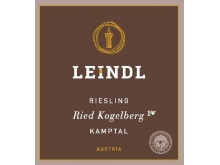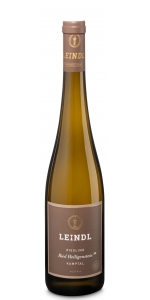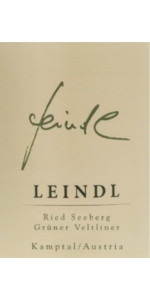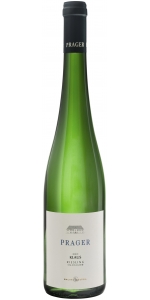Leindl Riesling Ried Kogelberg 2022
6 bottles with free shipping for: $300.00
12 bottles with free shipping for: $540.00
| BUY MORE! SAVE MORE! | ||||||||||||||||||||
|
Leindl Riesling Ried Kogelberg is made from 100 percent Riesling.
Kogelberg is known as a Grand Cru vineyard.
Delicate yellow tropical fruit paired with overripe apricots. Juicy, good complexity, fruity sweetness of ripe peaches, pleasant acidity, citrus touch in the aftertaste, good aging potential.
Review:
"Striking aromas of wild thyme and rosemary. Juicier than the nose suggests, this is a vibrant and complex dry riesling. I love the stoniness in the long, polished finish. Sustainable. Drink or hold.- Stuart PIGOTT"
- James Suckling (September 12th 2024), 94 pts
Leindl Estate
Georg Leindl has been a flying winemaker since 1989 at numerous wineries.
He has worked with and rented space from Nigl for some time.
He is currently working from 5 hectares of vineyards but he is planning on moving to 12 hectares in time.
Date Founded: 2013
Georg Leindl has been in the wine industry for quite some time, and in 2013, he decided to created his own Estate.
He studied Food and Biotechnology; He was a researcher at the Federal College for Oenology and Pomology at Klosterneuburg. He has also been a consultant in Oenology for International and National companies.
and a little Viognier too.
Grüner Veltliner is coming from the Seeberg vineyard. Total acreage is 2 hectares (4.94 acres)
Riesling is coming from the Heiligenstein vineyard. Total acreage is 3 hectares (7.41 acres)
Age of the vines is roughly 15 to 35 years old.
Leindl Riesling Zobinger Heiligenstein Kamptal is made from 100 percent Riesling.
Medium yellow green. Fine nuances of ripe apricot, a hint of yellow apple, delicate herbs and spices, mineral Touch, hints of candied orange zest. Juicy, elegant, fine stone fruit, touch of finesse acidity, salty minerality in the finish, remains long, already well to drink.
Cold Fermentation.
Aged on the lees for 12 months in Stainless Steel tank. No Oak.
No ML
Review:
"Anything but dramatic, this is a concentrated and beautifully crafted Heiligenstein dry riesling with the racy acidity and stony minerality we expect from this site. Very sleek and straight finish that some may find a bit tart, but we find very exciting. Sustainable. Drink or hold. - Stuart PIGOTT"
- James Suckling (Top 100 wines of Austria 2023, December 5th 2023), 94 pts
Leindl Riesling Zobinger Heiligenstein Kamptal is made from 100 percent Riesling.
Medium yellow green. Fine nuances of ripe apricot, a hint of yellow apple, delicate herbs and spices, mineral Touch, hints of candied orange zest. Juicy, elegant, fine stone fruit, touch of finesse acidity, salty minerality in the finish, remains long, already well to drink.
Cold Fermentation.
Aged on the lees for 12 months in Stainless Steel tank. No Oak.
No ML
Review:
"Aged on the lees for 12 months in stainless steel, this wine saw no oak. Its original name – Hellenstein -- referred to hell stone, as the vineyards are on a mountain where the “sun burns like hell.” It was later renamed Heiligenstein, which translates as holy rock, and is a geological island of desert sandstone, with volcanic matter. Its earthy slate character lends out scents and flavors of honeyed apricot, salty pears, and stone fruit pith."
-The Tasting Panel (May/June 2022), 94 pts
Leindl Riesling Zobinger Heiligenstein Kamptal is made from 100 percent Riesling.
Medium yellow green. Fine nuances of ripe apricot, a hint of yellow apple, delicate herbs and spices, mineral Touch, hints of candied orange zest. Juicy, elegant, fine stone fruit, touch of finesse acidity, salty minerality in the finish, remains long, already well to drink.
Cold Fermentation.
Aged on the lees for 12 months in Stainless Steel tank. No Oak.
No ML
Review:
"This excellent expression of the Heiligenstein site has a wonderful youthful tension. The sleek, medium-bodied palate features understated power, great precision and Amalfi lemon freshness. Very long, focused finish with a cascade of dry flowers. Sustainable. Drink or hold. - Stuart PIGOTT"
- James Suckling (September 12th 2024), 95 pts
Leindl Riesling Zobinger Heiligenstein Kamptal is made from 100 percent Riesling.
Medium yellow green. Fine nuances of ripe apricot, a hint of yellow apple, delicate herbs and spices, mineral Touch, hints of candied orange zest. Juicy, elegant, fine stone fruit, touch of finesse acidity, salty minerality in the finish, remains long, already well to drink.
Cold Fermentation.
Aged on the lees for 12 months in Stainless Steel tank. No Oak.
No ML
Review:
"Aged on the lees for 12 months in stainless steel, this wine saw no oak. Its original name – Hellenstein -- referred to hell stone, as the vineyards are on a mountain where the “sun burns like hell.” It was later renamed Heiligenstein, which translates as holy rock, and is a geological island of desert sandstone, with volcanic matter. Its earthy slate character lends out scents and flavors of honeyed apricot, salty pears, and stone fruit pith."
-The Tasting Panel (May/June 2022), 94 pts
Leindl Gruner Veltliner Seeberg Kamptal is made form 100 percent Gruner Veltiner. Medium yellow green. Fine yellow apple fruit, delicate hint of quince and honey, candied orange zest, highly attractive bouquet. Juicy, good complexity, extract core sweet, silky texture, fine acidity bow, fine and salty minerality, great length, secure aging potential, a very finesse Veltliner-style.
Review:
"Here’s a wonderfully cool and elegant Gruner Veltliner with mountain freshness that makes it very enticing. Medium-bodied and quite sleek, but with a touch of marzipan richness on the mid-palate, then a stunning wet-stone freshness in the long and polished finish. Drink or hold. - Stuart PIGOTT"
- James Suckling (October 10th 2024), 95 pts
Prager Smaragd Klaus Riesling is made from 100 percent Riesling.
Franz Prager, co-founder of the Vinea Wachau, had already earned a reputation for his wines when Toni Bodenstein married into the family. Bodenstein’s passion for biodiversity and old terraces, coupled with brilliant winemaking, places Prager in the highest echelon of Austrian producers.
Smaragd is a designation of ripeness for dry wines used exclusively by members of the Vinea Wachau. The wines must have minimum alcohol of 12.5%. The grapes are hand-harvested, typically in October and November, and are sent directly to press where they spontaneously ferment in stainless-steel tanks.
Klaus sits adjacent to Achleiten and is one of the Wachau’s most famous vineyards for Riesling. The vineyard is incredibly steep with a gradient of 77% at its steepest point. The southeast-facing terraced vineyard of dark migmatite-amphibolite and paragneiss produces a tightly wound and powerful wine. The parcel belonging to Toni Bodenstein was planted in 1952.
Tasting Notes:
Austrian Riesling is often defined by elevated levels of dry extract thanks to a lengthy ripening period and freshness due to dramatic temperature swings between day and night. “Klaus is not a charming Riesling,” says Toni Bodenstein with a wink. Klaus is Prager’s most assertive and robust Riesling.
Food Pairing
Riesling’s high acidity makes it one of the most versatile wines at the table. Riesling can be used to cut the fattiness of foods such as pork or sausages and can tame some saltiness. Conversely, it can highlight foods such as fish or vegetables in the same way a squeeze of lemon or a vinaigrette might.
Review:
What a stunning example of cool climate riesling. It’s full-bodied and deep, but so cool and delicate, packing in sleek layers of honeysuckle, apricots, lemons and grapefruit married to thyme and crushed rock. So long and seamless, with tension and focus that just keeps going. Sustainable. Try from 2025.
-James Suckling 98 Points
- back
In 1996, building on their tradition of excellence established at Duckhorn Vineyards, and their growing love of Pinot Noir, Dan and Margaret Duckhorn came to Anderson Valley to found Goldeneye. Anderson Valley has since earned acclaim as one of the world’s greatest Pinot Noir regions. Representing the pinnacle of our winemaking portfolio, Ten Degrees is made from only our finest lots, making it a Pinot Noir of unparalleled grace and grandeur.
Reviews:
From the best lots on the Golden- eye Estate, this wine aged in French oak for 16 months. Scents of wild cherry and sage are off the charts. Undeniable vibrancy, generous fruit, and floral notes create a mael- strom of flavor and texture that complements the wine's intensely high energy. Earthy, salty notes manifest in a kiss of soil, balsamic, cinnamon, and cedar.
-Tasting Panel 96 Points
A beautiful blend of the best barrels of all the single vineyards and it shows wonderful complexity and thoughtfulness. Layered and complete, giving you so much flavor and deliciousness.
-James Suckling 96 Points
M. Chapoutier Hermitage Monier de la Sizeranne is made from 100 percent Shiraz.
In Hermitage, Syrah achieves its noblest expression and La Sizeranne has become a benchmark wine for the region. M. Chapoutier's roots in the Rhône date back to 1808, when the family first settled in Tain l'Hermitage. The family purchased a winery owned by Comte Monier de la Sizeranne and over time, acquired a number of excellent vineyards, including some of the oldest in France. M. Chapoutier was the first winery to put Braille on a wine label in 1996. Maurice Monier de la Sizeranne was the owner of the plot of the Hermitage, la Sizeranne until he was blinded in a hunting accident and unable to take care of the land, choosing instead to sell to the Chapoutier family. Following his accident, Maurice became the inventor of the first version of abbreviated Braille, and Chapoutier included Braille on the wine labels as a tribute to his work.
he grapes ferment in open wooden vats after total destemming. Two daily treadings ensure a good extraction of the tannins. Maturation takes place in oak casks, of which one third is new. Several rackings permit a slow and natural clarification process. The wine is unfiltered and unfined.
Review:
I was blown away by the 2019 Hermitage Monier De La Sizeranne, and if there’s a best buy out there in 2019 Hermitage, this might be it. Blackberries, black raspberries, spice box, new leather, and bouquet garni all dominate the bouquet, and it’s full-bodied, with a round, layered mouthfeel, beautiful tannins, and a rare mix of richness and elegance. It’s a stunning wine that’s guaranteed to put a smile on your face over the coming 2+ decades. Hats off to the team at Chapoutier!
-Jeb Dunnuck 97 Points








